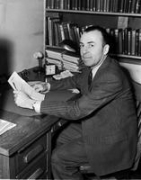Awards
- National Academies - 1933
- American Association for the Advancement of Science

Winthrop Kellogg was an American comparative psychologist who made major contributions to the study of animal behavior. He began his studies at Indiana University in 1916 but paused his education to serve in World War I as part of the American Expeditionary Forces in the US Army Air Service. After his service, he returned to IU and graduated in 1922 with a degree in Philosophy and Psychology. He then pursued graduate studies at Columbia University and graduated with a master’s degree in 1927 and his Ph.D. in 1929, focusing his research on psychophysics. He returned to Indiana University as an assistant professor in 1930 and became a full professor by 1937.
During his time at IU, Kellogg established a research laboratory to study conditioned behavior in dogs. He also explored topics such as sonar and echolocation in dolphins. One of his most influential works was a groundbreaking research project which compared the development of human and nonhuman primates. No other investigation in his career would bring him quite as much attention as this project would. In it, he argued for the necessity of comparative developmental studies of humans and non-human primates. Kellogg was interested in determining the relative influence of nature and nurture on behavior and proposed to raise an infant chimpanzee with his own infant son. The results of the project were published in his book “The Ape and the Child” which left a significant mark in the fields of psychology, anthropology and biology. In 1950, Kellogg moved to Florida State University, where he continued his outstanding work.